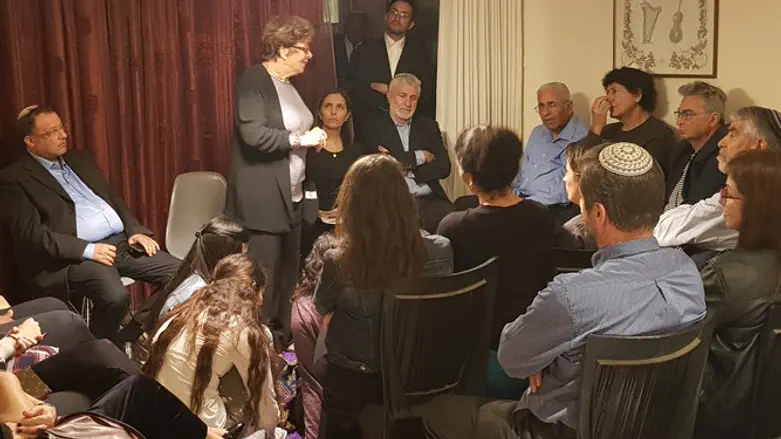
Social Equality Minister Gila Gamliel (Likud) on Wednesday evening hosted Holocaust survivor Esther Schlesinger from the city of Efrat in Gush Etzion.
In a moving meeting, attended by dozens of people, the 80-year-old Schlesinger recounted her experiences during World War II, in which she lost her mother and four brothers who were murdered in Auschwitz, while she and her sister were saved by a Hungarian family who hid them in their home until the end of the war.
Schlesinger, who has a long and impressive educational career as a teacher, principal and school supervisor, is married to Professor Tuvia Schlesinger, a Holocaust survivor himself. They have three children.
She was born in northern Hungary to a wealthy religious family. In 1944, her father was taken to labor camps, and her mother and her four brothers were sent to Auschwitz together with the other members of their community.
Esther and her sister were actually saved by an anti-Semitic family who hid them in their home until the end of the war in exchange for a payment that their mother transferred to the family before being taken to Auschwitz. Their mother paid half the sum when her daughters were taken in by the family and explained that the remainder will be paid following the conclusion of the war.
For two years, Esther and her sister were taught to hate Jews, as one member of the family that took them in was a member of the Hungarian Nazi Party. Esther’s aunt, the sister of her mother, survived the war, knowing that her nieces were with the Hungarian family and that she had to pay the remaining sum.
The aunt had a small boy at the time and she could not leave him alone in order to bring back her nieces. Instead, she hired a Hungarian girl and gave her the remainder of the payment that was promised to the Hungarian family. When the girl arrived at the family home, she turned to Esther and her sister. "I came to pick you up," she said. "Where?" they asked, upon which she replied, "To the Jews." Esther and her sister, who had been taught in the family's home to hate Jews, broke into tears and refused to go with the girl. It was only after she told them that she would take them to their mother, whom they had missed throughout the war, that they agreed and joined her, thus reuniting with their aunt.
Esther made Aliyah to Israel in 1946, where she also reunited with her father who survived the war and made Aliyah to Israel. In Israel, her father remarried.
In March 1993, her younger brother, Shaya Deutsch, was murdered in his home in Kfar Yam in Gush Katif, at the age of 39. Esther said that her brother's death in the Land of Israel, in the Jewish state, evoked the pain and grief over the murder of her mother and brother in Auschwitz. Since that time, she has been dealing more and more with the memory of the Holocaust, after not dealing with it for many years and choosing to focus on building a new life in the Land of Israel.
Minister Gamliel summed up the meeting and said, "We, as citizens and as a state, have a moral imperative to remember, to remind and not to forget. The State of Israel and the entire Jewish people will not forget the memory of the Holocaust and ensure that its memory will be preserved forever. I am privileged to take part in the important project of commemorating the legacy of the Holocaust, for us and for future generations. Esther Schlesinger, who lost her family, is a noble and powerful person whose story of survival and resurrection is an inspiring and admirable example."
